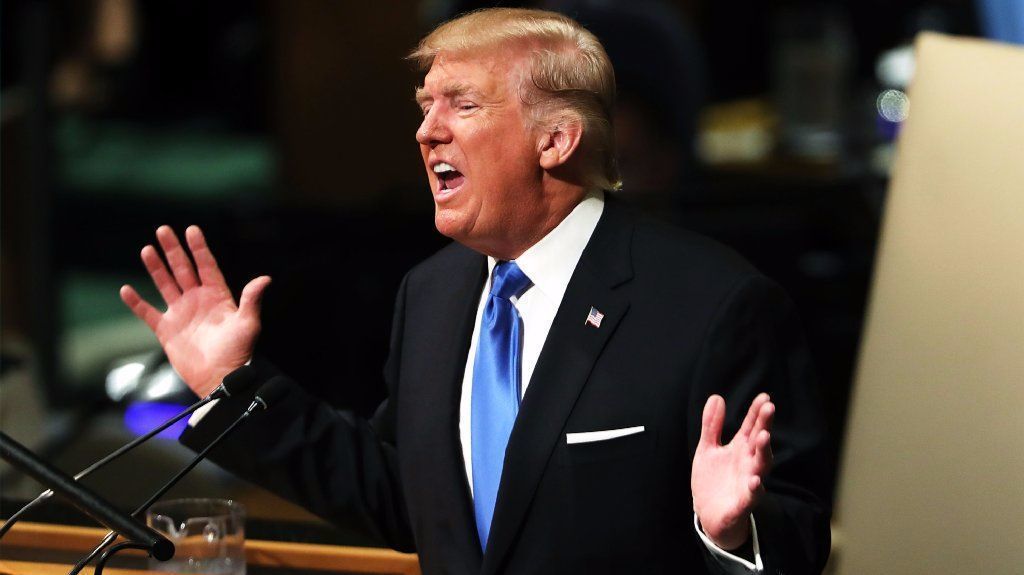“It may be Trump who is the most deserving recipient of the Rocket Man sobriquet”
Professor David Dunn of the University of Birmingham writes:
After eight years of measured diplomacy from the Obama Administration at the UN and elsewhere, Donald Trump’s first speech to the General Assembly was a flashback to the early years of President George W Bush.
The mention of “rogue regimes” and “terrorists and extremists”, the focus on North Korea and Iran, and an end to “safe havens” in Afghanistan were deeply reminisant of Bush’s January 2002 “Axis of Evil” speech. And, like that address, Trump’s oration was an invitation to the states assembled and the UN itself to solve the problems of Iran and particularly North Korea — or to own responsibility for America “sorting out” these problems instead.
Much has made of Trump’s line that the “Rocket Man is on a suicide mission for himself and his regime”, but what comes next is more important as the unifying theme of the speech:
The United States is ready, willing, and able. But hopefully this will not be necessary. That’s what the United Nations is all about. That’s what the United Nations is for. Let’s see how they do.
This was praise of the UN, singling out Russia and China, for supporting sanctions on Pyongyang, and the suggestion that working together offered “immense promise” to avoid the “valley of disrepair”. This was Trump giving the UN the the first chance to quiet the threats as America sees them, before Washington seeks alternative solutions.
But that invitation is twinned with a threat. Trump’s statement on the Iran nuclear deal — “I don’t think you’ve heard the last on this. Believe me” — was a chilling reference to test the UN, as Bush did, to demonstrate its incapacity before the US acts unilaterally. Trump’s repeated praise of “strong sovereign nations” acting in their own self-interests can also be read as a harbinger of what may follow.
While this speech echoed the “Axis of Evil”, it went considerably further in several important respects. Trump abandoned the convention established in 2001 of talking about combating “terrorism” by inserting the phrase, favored by hard-right activists like his speechwriter Stephen Miller, “radical Islamic terrorism”. Bush was smart enough to recognize that associating terrorism with one of the world’s great religions is antagonistic to followers of that faith — Trump is more interested in pandering to his base electorate.
Even more worrying was Trump’s decision to ramp up the rhetoric with North Korea. Rather than seeking to calm tension, Trump added to his escalatory language of “locked and loaded” and “fire and fury” with the mocking nickname of “Rocket Man” for North Korean head of state Kim Jong-un. While this tone might be appropriate for reality TV shows or Twitter rants, the goading and ridiculing of an isolated and unpredictable dictator at a time of international tension with that regime is irresponsible. If the intention is to persuade Kim to end North Korea’s missile and nuclear programs, this is an odd way to go about it.
The colloquial insult was accompanied by a precise and deliberate threat: “If forced to defend itself or its allies, [the US] will have no choice but to totally destroy North Korea.”
The key words here are “no choice” and “totally destroy”. This was a statement that repudiates previous American declarations that the US has no quarrel with the North Korean people. It takes off the table talk of “all options”, which would include diplomacy, being open, and instead threatens the annihilation of 25 million people. If North Korea wasn’t paranoid about the “US threat” before this speech, then they most certainly will be now.
Nor was this Trump’s last word on this subject, as he said that North Korean “denuclearization is the only acceptable future”. Going beyond his previous statements of deterrence towards the more demanding requirement of compellence, Trump raised the bar of an acceptable result. Stopping North Korea from attacking its neighbours with ballistic missiles and nuclear weapons is one matter — getting them to denuclearize through a process of threats and insults is a much different task.
If “denuclearizing” North Korea is the genuine goal behind Trump’s UN performance, then the possibility of armed conflict has just become more real. That may mean that it is Trump who is the most deserving recipient of the Rocket Man sobriquet.

